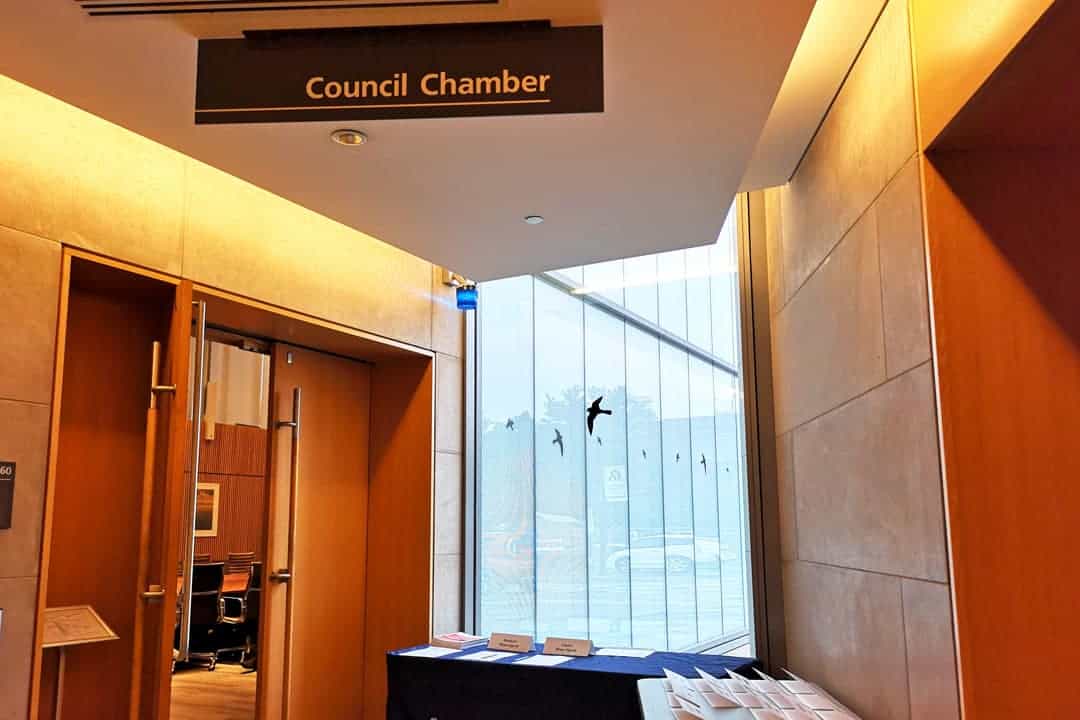The UTSC Campus Affairs Committee held a meeting on May 9, in which it received a presentation on UTSC’s 2022–2023 operating budget. The budget report revealed that international tuition fees account for more than 60 per cent of UTSC’s revenue for the 2022–2023 academic year — a 22 per cent increase since the 2017–2018 academic year.
The committee also received reports from UTSC Campus Safety and UTSC Community Partnerships and Engagement, as well as updates on the university’s COVID-19 policies.
International students in the operating budget
UTSC’s Chief Administrative Officer Andrew Arifuzzaman presented the budget breakdown for the 2022–2023 academic year.
UTSC’s net expense budget for the 2022–2023 year is $338.3 million, which represents an increase of almost $5 million from last year. By 2026–2027, this budget is expected to grow to $393.3 million.
International tuition fees continue to be UTSC’s largest source of revenue. These fees have grown from constituting 42 per cent of UTSC’s total operating revenue in 2017–2018 to 64 per cent in 2022–2023. This percentage is to remain relatively constant up to 2026–2027.
In contrast, domestic tuition fees and provincial funding have dropped. In 2017–2018, they comprised 30 per cent and 26 per cent of UTSC’s total operating revenue, respectively. In 2022–2023, they comprise only 17 per cent and 15 per cent of UTSC’s operating revenue, respectively — percentages projected to remain relatively unchanged up to 2026–2027.
International undergraduate students comprise 33 per cent of enrolments, while domestic students make up 67 per cent. Speaking of the tuition discrepancy between these two groups, Arifuzzaman concluded, “Our reliance on international income is growing.”
Arifuzzaman added that UTSC’s “real focus… [is to] diversify the makeup of the international students coming to the campus.” This diversification effort stems from concerns of overreliance on a single-source country. One reason could be sudden changes that may prevent students from that country from travelling to Canada. Arifuzzaman cited the recent lockdowns in Beijing that have prevented them from participating in the Green Path program — a 12-week summer program that allows 15 students from China to attend UTSC. Currently, the Canadian government advises that people “exercise a high degree of caution” before travelling to China, as the COVID-19 restrictions in the country are strict and may “disrupt” freedom of movement.
Decreased occurrences of crime on campus
Tanya Poppleton — director, campus safety at UTSC — presented the 2021 Campus Safety report.
In 2021, the overall occurrences of crime on campus decreased; a total of 28 crimes were reported on campus in 2021, whereas there were 58 crimes reported in 2020 and 110 crimes reported in 2019. “There wasn’t a whole lot of [criminal] activity on campus,” said Poppleton.
However, in 2021, cases of fraud increased in comparison to the previous year. Poppleton attributed this increase to the growing incidents of phishing scams targeting international students.
“We’ve taken measures to work with our international student programs as well as general students to talk about what fraud looks like… and what resources are available to them,” assured Poppleton.
Although the overall occurrences of crime on campus decreased in 2021, there was a significant increase in security alarms and fire alarms. Poppleton said that these could have been caused by the activation of door contact alarms and panic buttons, as well as faulty sensors.
Last year, U of T Campus Police rebranded as the Campus Safety Special Constable Service. At the meeting, Arifuzzaman explained this change: “It’s not just rebranding. It’s actually changing the mindset… What used to be campus police, which was all about enforcement, is now changing to community safety, which is all about support.”
To this end, UTSC Campus Safety hired its first ever student crisis response coordinator, Khadija Uddin, last month. Uddin, who will not be in the Campus Safety uniform, is tasked with being the first staff member to respond to students experiencing a mental health crisis. Poppleton explained that this new position would help reduce the presence of uniformed officers in such situations.
As part of the rebrand, Campus Safety has also updated their website design, uniform patches, and recruitment strategies. Additionally, it has begun training constables on de-escalation and nonviolent crisis intervention.
COVID-19 updates
Arifuzzaman reiterated that U of T’s mask mandate policy will last until June 30. He anticipates that this mandate may be “far less restrictive” in the upcoming fall term, but noted that administrators will “always [be] prepared” to reinstate the mandate should the need arise.
Although the mask mandate policy remains subject to change, Arifuzzaman assured students that there is presently “nothing that says that you cannot wear a mask” on campus. Students more comfortable wearing masks are “absolutely free” to do so.
Arifuzzaman explained that, while UCheck no longer requires health screening, the university is still “strongly encourag[ing]” people on campus to log-in to UCheck and upload their proof of vaccination. The university also encourages people to use the provincial screening tool before coming to campus.
Engaging the Scarborough community
Kimberley Tull — director, community and learning partnerships and access pathways — along with Melanie Blackman, the community partnerships team lead, presented the 2022 Community Partnerships and Engagement annual report, titled “Purposeful Impact.”
Tull affirmed the university’s desire to become more intentional as an institution and consider the direct impact of its projects on the community.
With this focus in mind, initiatives were envisioned to benefit the surrounding Scarborough community. These include the MAAT REACH Program, which provides local Black and Indigenous youth employment opportunities at UTSC.
Blackman reported that the team had also engaged with both internal and external community members to inform UTSC’s policies and structures. Following these consultations and discussions, they published a Working Circle report last month that reviewed UTSC’s curriculums and provided recommendations for improval.


